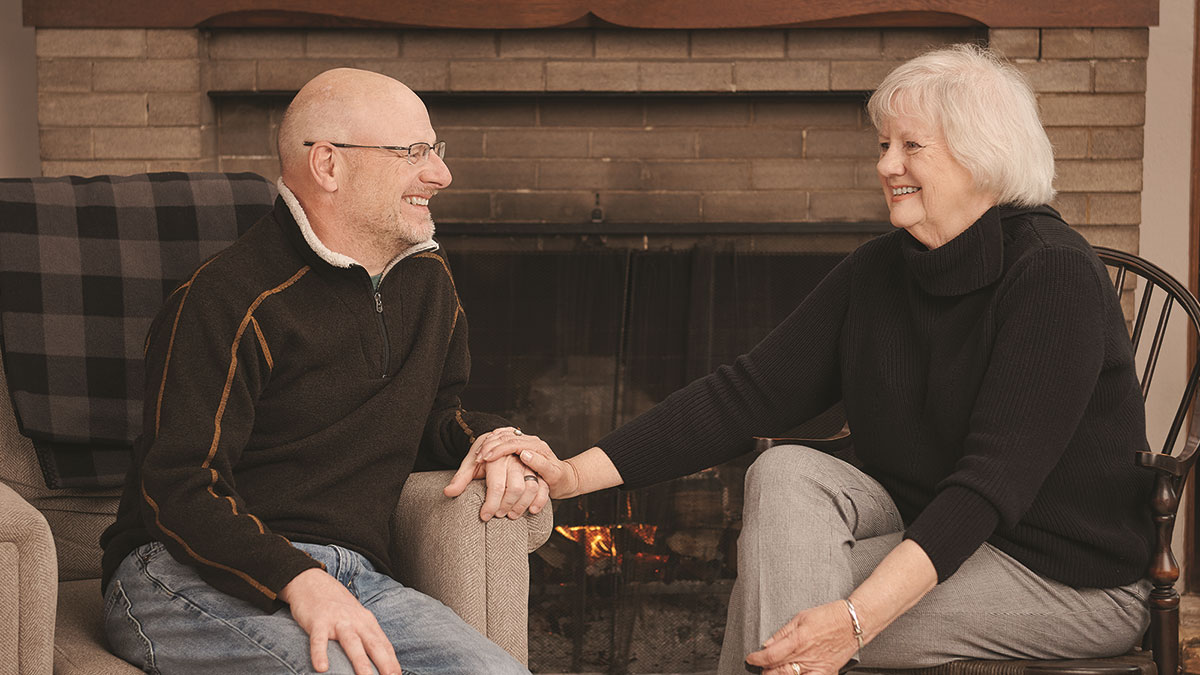
On December 11, 2021, Donna was looking forward to a family brunch at The Ritz-Carlton, where she had retired earlier that year after 30 years in the finance department. Joining her were her husband, Paul, their son Brian and his wife, Jennifer, and their two sons, Lucas and Miles.
After returning from the buffet with her plate of food, Donna sat at the table when Brian and Jennifer noticed that Donna's face on the left side was drooping before she collapsed into the wall next to her.
As an emergency room nurse at Missouri Baptist Medical Center, Brian recognized the signs of a stroke and told his mom, "I think you're having a stroke," before beginning an assessment and calling 911.
A stroke occurs when blood flow to a part of the brain is interrupted because of a broken or blocked blood vessel. After a blood vessel is blocked, it cannot carry oxygen and nutrients to the brain. When that happens, part of the brain cannot get the blood and oxygen it needs, so it starts to die.
Stroke treatment and recovery look different depending on the severity of the stroke and how quickly it is caught. If a stroke is suspected, it's important to act quickly and call 911. Besides helping patients quickly get to the hospital, paramedics will notify the emergency room (ER) before arrival so staff can prepare medication and other interventions that can help reduce the risk of damage or death.
Donna doesn't recall much about that day but remembers thinking, "I can't be having a stroke. There's no history of stroke in the family."
When the ambulance arrived, Brian rode with Donna to Missouri Baptist, while Paul and the family followed in their cars.
Registered nurse and MoBap's Stroke Program coordinator Shelley Donnelly explained that when patients with stroke symptoms arrive in MoBap's emergency department, they are seen within minutes by experts for acute stroke care, who may provide various treatment options, including medication or neurologic intervention.
Once at MoBap, Donna was immediately evaluated and had a computed tomography (CT) scan to diagnose the type of stroke she had. Donna's test results revealed that she suffered an ischemic stroke, which is a stroke caused by a blood clot blocking blood flow to a region of the brain. Because her stroke wasn't caused by a broken blood vessel (hemorrhagic stroke), she could receive tPA treatment, which doctors gave her through her IV.
Brian explained that tPA (tissue plasminogen activator) breaks down clots and helps restore blood flow to the brain. "At MoBap, our goal is to give tPA treatment in less than 45 minutes after the patient comes through the doors." Donna received the medication within 26 minutes.
After doctors stabilized Donna, she was transferred to the intensive care unit (ICU), where she stayed for three days before moving to the neurology floor. "On December 14, I was transferred to MoBap's inpatient rehab unit for further recovery."
Donna explained that she had problems with swallowing, balance and coordination after her stroke. "I also had left neglect which means I had a hard time seeing and responding to things on the left side of my body."
While in rehab, Donna worked daily with physical and occupational therapists. "All the therapists were amazing," she said. "They had me up and walking, doing exercises to improve my coordination, and even had me cooking and taking things out of cabinets to help get me ready for home. I noticed that every day I was doing better."
Donna was discharged home on December 25, earlier than initially expected. When asked about how she feels three months after her stroke, Donna said she feels good. "I'm on blood-thinning medication, and I'm taking my doctor's advice about exercising and eating a healthy diet. Even my left neglect has gone away, and I got clearance from my eye doctor to drive again."
Reflecting back on her experience, Donna focuses on continuing to move forward and gives credit to Brian for his quick action at the restaurant and getting her to MoBap. "He saved my life," she said. "I know I'm lucky, and I'm grateful to all the doctors, nurses and therapists who helped me and the wonderful care I received at MoBap."
BE FAST
Know the Warning Signs & Symptoms of Stroke
Check for any one of these signs and symptoms which could mean a stroke:
- Balance – Loss of balance?
- Eyes – Vision loss in one or both eyes??
- Face – Uneven face or smile??
- Arms – Can’t raise both arms for 10 seconds??
- Speech – Slurred speech??
- Time – Time is critical.Call 911 right away.
Stroke Risk Factors
- High blood pressure
- High cholesterol
- Heart disease
- Diabetes
- Smoking
- Heavy alcohol use
- Physical inactivity and obesity
- Atrial fibrillation (irregular heartbeat)
- Family history of stroke